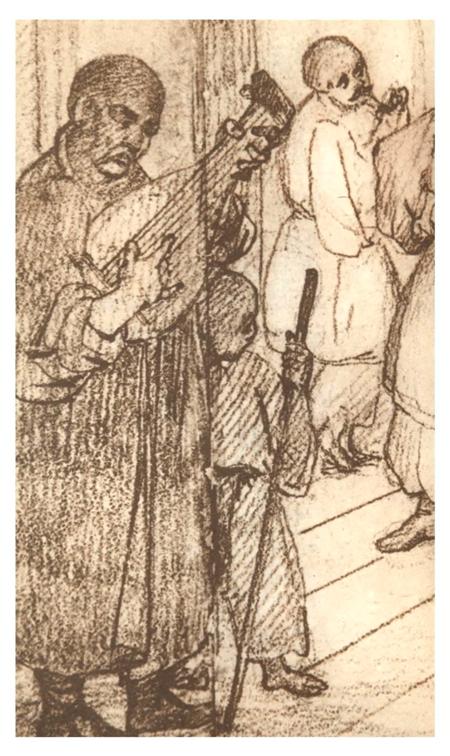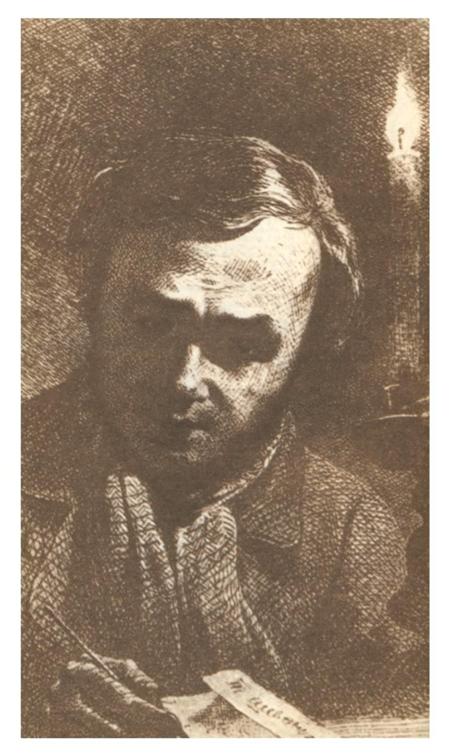|
|
|
|
|

Taras Shevchenko. Cossacks Feasting. Detail. Pencil. 1838.
|
Taras Shevchenko
THOUGHTS OF MINE,
О THOUGHTS OF MINE
("Dumy moji, dumy moji,
Lykho meni z vamy!")
Translated by Irina Zheleznova
Thoughts of mine, О thoughts of mine,
You plague and torment me!
On paper you throng, thoughts,
By dark anguish sent me.
Why did wind not disperse you?
Why were you not smothered
While still in the cradle
By sorrow, your mother?...
For the world to mock at born were you, upon you
Tears rained down in torrents — why did they not drown you
In the sea or merge you with the steppeland waters?...
None would then have wondered why I suffer, none
Would have asked why curse I destiny or sought to
Lecture me and mutter: “Nothing to be done!”
Jestingly....
Come, tell me, children mine, my cherished
Blooms - is there a heart, dears, anywhere like this
Aching heart of mine, dears, one on salt tears nourished,
That will weep like mine does.... Let us hope there is!
It a maid’s heart and a pair of
Brown eyes over you
Weep, my thoughts, I’ll ask for nothing
More: a tear or two
From those eyes, and I am king of
Kings upon this earth!
Thoughts of mine, O thoughts of mine,
’Tis sorrow gave you birth.
Ah, those eyes so brown and sparkling,
And those brows so dark!...
It is they my heart awaken,
Make it pound, and — hark!
Laugh in glee, and pour out verses,
Sing, and whisper of
Starry nights, and cherry orchards,
And a dear maid’s love.
And my sweet Ukraine.... My heart is
Silent and forlorn.
Sing ’twill not, for it is parted
From its'land and home.
Here, where snows lie deep, to council [3],
With their maces [4] bright
And bunchuks [5], the Cossacks merry
It will not invite.
Let their spiritis roam the distant
Steppes of the Ukraine,
Boundless steppes where winds fly freely
And where gladness reigns.
Breadth and space.... The mounds are mountains...
Vaster than a sea
Is the Dnieper, like our long-lost
Cossack liberty
That was born, that rode and pranced there
But its hot blood cooled, and slumber
Came, and lo! — it bound
Fast its limbs, and soon above it
Grew a fresh new mound.
O’er the mound an eagle watches,
Black-winged, menacing,
And of all that passed the minstrels
In their songs they sing.
Old and blind, they sing of freedom
And of fame.... but I
Cannot sing, for words escape me,
I can only cry
For Ukraine, my homeland.... Sorrow,
Curse it, leaves me mute!...
All have known it, all have tasted
Of its bitter fruit.
As for him who with his heart’s eye
Sees us all — a hell
Is this world for him, so help me,
And the next —
Ah, well!...
Never knew I joy, nor will it
Come to me if I
Grieve ’thout end.... Let grief be short-lived,
Let it snake-like lie
Coiled within my breast and hidden
From the evil sight
Of my foes.... And may its laughter
Reach them not.... By night
And by day my thoughts are ravens;
Let them croak while my
Heart, a songbird, trills and warbles,
While it softly sighs,
Sighs and moans with none to hear it
Or to taunt it ... Pray,
Let me weep, and do not try to
Wipe my tears away.
Let them flow and flood the alien
Field till that a priest
Comes and covers me with alien
Earth.... Ah, me! No peace
Grief will bring me.... And if any
(I need say no more)
us poor, homeless orphans envy -
Punish them, O Lord!
Thoughts of mine, O thoughts of mine,
Dear my children own!
Nurture you I did — but where,
Tell me, is your home?
To beloved Ukraine, my mother,
Make you haste and fly.
As for me, ’tis here I’ll perish,
Here it is I’ll die.
There you’ll shelter find, my orphans,
Truth’s unwavering flame,
Kindly words, a heart that’s friendly,
Aye, and, maybe, fame.
And of you, Ukraine, my homeland,
This do I entreat:
Like your own, my foolish children,
Born of sorrow, greet!
|
|
Poem of Taras Shevchenko
"Thoughts of mine, О thoughts of mine"
"Dumy moji, dumy moji, lykho meni z vamy!"
("Думи мої, думи мої, лихо мені з вами")
[1839, S.-Petersburg (Санкт-Петербург)]
Translated by Irina Zheleznova
NOTES:
[3] ...to council..., in the 16th-18th centuries the Ukrainian Cossacks decided their important affairs at general meetings (Cossack councils).
[4] Mace, a symbol of authority used by the Hetman - the Commander-in-Chief in the Cossack army.
[5] Bunchuk, a staff embellished with a horse’s tail used by the Cossacks as a banner and a symbol of the Hetman’s authority.
Source: Taras Shevchenko. Selected poetry. Kiev, Dnipro, 1977, p.45 - 49.
Original publication:
Taras Shevchenko. Zibrannja tvoriv: U 6 t. — K., 2003. — T. 1: Poezija 1837-1847. — S. 124-126; S. 631-633.

Taras Shevchenko. Self-Portrait by Candle-Light. Detail. Etching, aquatint. 1860.
(Тарас Шевченко. Автопортрет з свічкою, фрагмент. Офорт, акватинта. 1860).
|
Тарас Шевченко
ДУМИ МОЇ, ДУМИ МОЇ
Думи мої, думи мої,
Лихо мені з вами!
Нащо стали на папері
Сумними рядами?..
Чом вас вітер не розвіяв
В степу, як пилину?
Чом вас лихо не приспало,
Як свою дитину?..
Бо вас лихо на світ на сміх породило,
Поливали сльози... Чом не затопили,
Не винесли в море, не розмили в полі?
Не питали б люди, що в мене болить,
Не питали б, за що проклинаю долю,
Чого нужу світом? «Нічого робить», —
Не сказали б на сміх...
Квіти мої, діти!
Нащо вас кохав я, нащо доглядав?
Чи заплаче серце одно на всім світі,
Як я з вами плакав?.. Може, і вгадав...
Може, найдеться дівоче
Серце, карі очі,
Що заплачуть на сі думи —
Я більше не хочу...
Одну сльозу з очей карих —
І... пан над панами!..
Думи мої, думи мої!
Лихо мені з вами!
За карії оченята,
За чорнії брови
Серце рвалося, сміялось,
Виливало мову,
Виливало, як уміло,
За темнії ночі,
За вишневий сад зелений,
За ласки дівочі...
За степи та за могили,
Що на Україні,
Серце мліло, не хотіло
Співать на чужині...
Не хотілось в снігу, в лісі,
Козацьку громаду
З булавами, з бунчугами
Збирать на пораду...
Нехай душі козацькії
В Украйні витають —
Там широко, там весело
Од краю до краю...
Як та воля, що минулась,
Дніпр широкий — море,
Степ і степ, ревуть пороги,
І могили — гори.
Там родилась, гарцювала
Козацькая воля;
Там шляхтою, татарами
Засівала поле,
Засівала трупом поле,
Поки не остило...
Лягла спочить... А тим часом
Виросла могила,
А над нею орел чорний
Сторожем літає,
І про неї добрим людям
Кобзарі співають,
Все співають, як діялось,
Сліпі небораки,
Бо дотепні... А я... А я
Тілько вмію плакать,
Тілько сльози за Украйну...
А слова — немає...
А за лихо... Та цур йому!
Хто його не знає!..
А надто той, що дивиться
На людей душою —
Пекло йому на сім світі,
А на тім...
Журбою
Не накличу собі долі,
Коли так не маю.
Нехай злидні живуть три дні —
Я їх заховаю,
Заховаю змію люту
Коло свого серця,
Щоб вороги не бачили,
Як лихо сміється...
Нехай думка, як той ворон,
Літає та кряче,
А серденько соловейком
Щебече та плаче
Нишком — люди не побачуть,
То й не засміються...
Не втирайте ж мої сльози,
Нехай собі ллються,
Чуже поле поливають
Щодня і щоночі,
Поки, поки... не засиплють
Чужим піском очі...
Отаке-то... А що робить?
Журба не поможе.
Хто ж сироті завидує —
Карай того, Боже!
Думи мої, думи мої,
Квіти мої, діти!
Виростав вас, доглядав вас —
Де ж мені вас діти?..
В Україну ідіть, діти!
В нашу Україну,
Попідтинню, сиротами,
А я тут загину.
Там найдете щире серце
І слово ласкаве,
Там найдете щиру правду,
А ще, може, й славу...
Привітай же, моя ненько!
Моя Україно!
Моїх діток нерозумних,
Як свою дитину.
(1840, Санкт-Петербург)
|
|
За матеріалами: Тарас Шевченко. Зібрання творів: У 6 т. — К., 2003. — Т. 1: Поезія 1837-1847. — cтор. 124-126; 631-633.
More Taras Shevchenko's poems translated from Ukrainian into English by Irina Zheleznova:
Irina Zheleznova - writer and translator, who seems to have worked for most of the major publishing houses of the former Soviet Union. She translated some of Taras Shevchenko's poetical works into English language in 1964, having original melodic and rhythmic patterns been preserved.
Споріднені публікації, за тегами:
|
|
|
|
|
|

